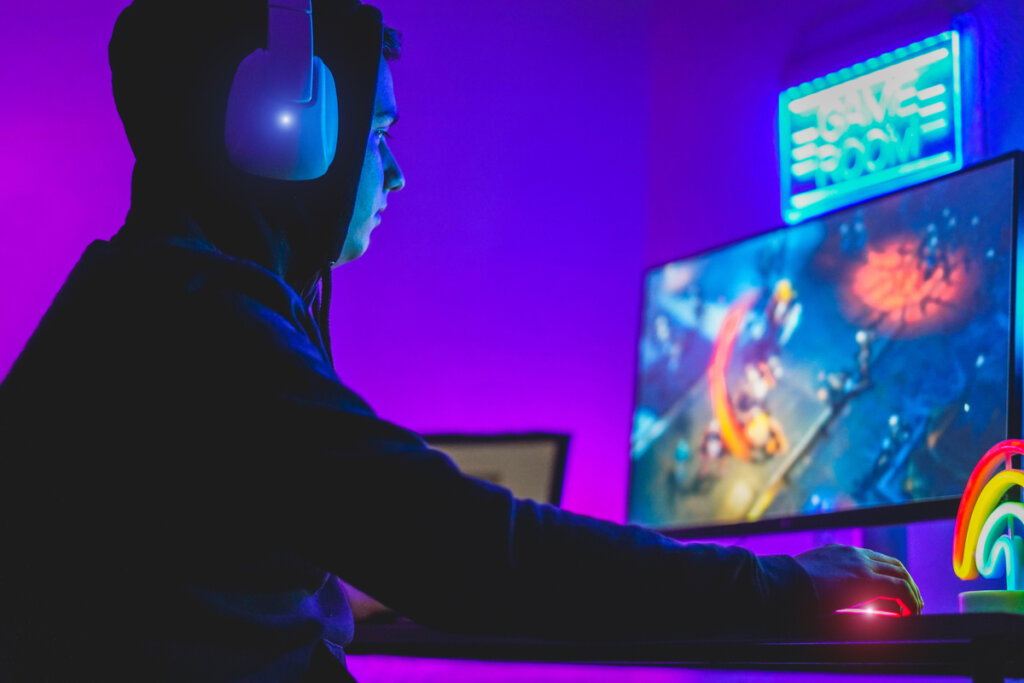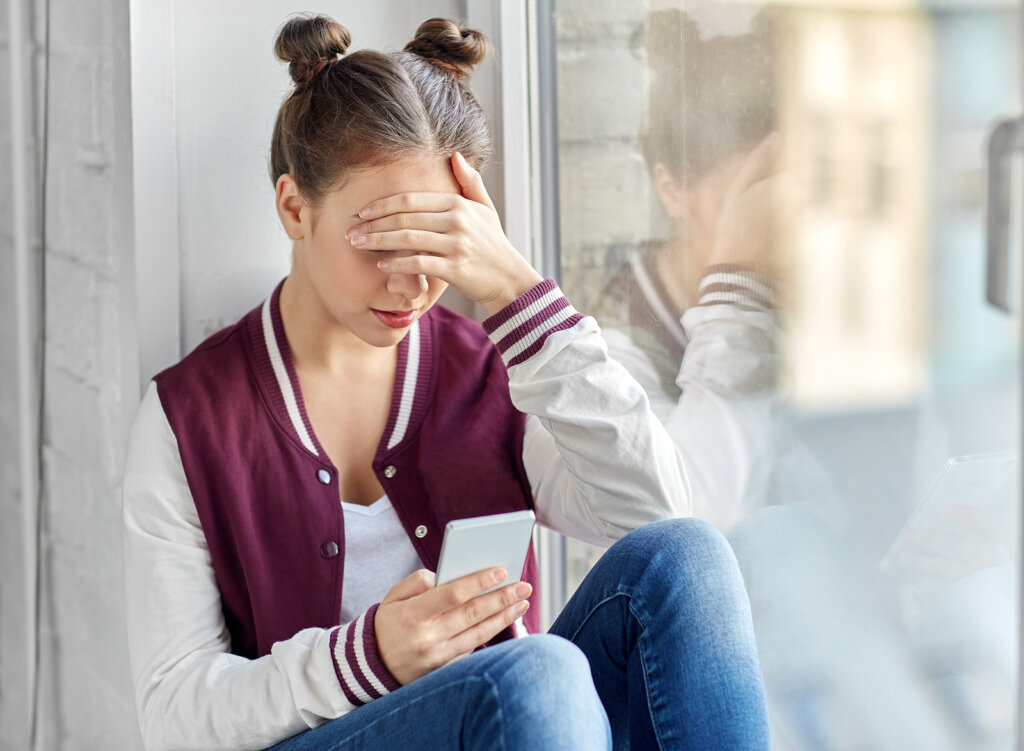Teen Influencers and their Psychological Impact on Children Today


Written and verified by the psychologist Valeria Sabater
Few children dream of being astronauts anymore. In fact, now they’re more likely to want to be teenage influencers, which involves both being famous and making easy money. Indeed, young people now have these new reference figures to imitate who greatly inspire them. They’re public figures with seemingly perfect lives. They speak to children about the world of video games, beauty, cinema, art, social issues, and the environment.
The fact that children want to be YouTubers or have their own Twitch channel with millions of followers isn’t, in itself, a problem. The concern lies in how the new generations are fully subject to everything that happens in that parallel digital universe. As a matter of fact, there are many children between the ages of eight and 12 who spend an average of six hours a day online.
However, parents shouldn’t only be aware of how long their children spend on their mobile devices. They should also know what type of content they’re looking at. Obviously, not everything they see is harmful or dangerous. Nevertheless, many studies now remind us that more than 70 percent of teenage YouTube subscribers have complete trust in the celebrities they follow almost blindly.
They believe everything they’re told, they yearn to have the products the influencers are promoting, and they don’t doubt any ideas that these media gurus put forward. That’s because children and adolescents haven’t yet fully developed the skill of critical thinking. For this reason, they’re extremely vulnerable to everything that comes their way from these digital settings…
An influencer is validated as an authority figure in a certain area. For children and adolescents, this has a greater impact because they see them as absolute references on almost any subject, not just the one they promote or talk about.

They want to be like the teen influencers
Currently, there are thousands of fully established teen influencers who accumulate millions of followers and completely captivate their child-based audiences.
The it-girls are influencers in the field of fashion and beauty. There are also influencers in the world of video games, as well as young actors or figures who, due to their charisma, also attract this particular age group.
Marketing psychology tells us that this phenomenon hides some positive aspects and other less pleasant ones. On the one hand, successful influencers produce a high economic return for the big brands. However, this is achieved at the cost of deep and sophisticated mental manipulation. In fact, children and adolescents have become the main focus of desire of the advertising industry here.
The halo effect, everything you say and do is fine
Teen influencers are both authority and reference figures for children. This is basically due to the confirmation bias or halo effect. In other words, everything they say or do is viewed by the children as both correct and inspiring. It doesn’t matter that the YouTuber is an expert on video games, if they also advertise an energy drink for their audience, it’s highly likely that it’ll be the one that the child asks their parents for.
On the other hand, if that same YouTuber demonstrates macho ideas or if they show a dangerous political ideology, it’s likely that children will also integrate these ideas without even realizing it. Without questioning the influencer at all.
Social conformity and a sense of belonging
Children gradually discover, when they become familiar with the various Instagram, TikTok, YouTube, or Twitch channels, that communities are created. In fact, celebrity followers become another way of making friends online and creating a sense of belonging with each other. They share passions, hobbies, experiences, etc.
Teen influencers motivate their communities of fans, transmitting ideas, and advertising a specific lifestyle to them. Children and adolescents develop a kind of progressive social conformity in this regard. They hardly question anything they see on a daily basis and give full credibility to the guru. In addition, they have a group of online friends who further reinforce this adherence, whether or not it’s beneficial to them.
Teen influencers become authority figures for children. Furthermore, children often pay more attention to what they say than they do to their parents.
The mirage of the perfect life: Wanting what they see
Nanyang University in Singapore, Nijmegen University in the Netherlands, and San Diego University in the United States conducted research that highlighted something interesting. They found that the influencers phenomenon has a huge impact when it comes to advertising, branding, and social media performance.
The consumption behaviors of adolescents in these cases haven’t been studied to any great extent. Nevertheless, one thing we do know is that young people are complete captives of everything they see in this digital universe. Furthermore, they long for the lives of the teenage influencers they follow.
However, wanting what they see and perceiving it as so distant makes them feel frustrated. In fact, they don’t just ask their parents to buy the products that influencers advertise for them. They want to be like them, dress like them, have their figure, their hair… It’s hardly surprising that this often translates into problems with self-esteem, anxiety, and the development of eating disorders.

When they grow up they want to be influencers
The desire to be a teenage influencer leads these children to establish poorly adapted perspectives. They want to work and become successful with little or no effort, have millions of followers overnight, and become millionaires at the snap of their fingers.
On the other hand, it’s true that not all children and adolescents have this goal. However, it’s worth remembering that the models that children become familiar with early in their lives, do sometimes cause them to harbor ideas that, in the long term, could lead to feelings of disappointment and hopelessness.
Therefore, it’s recommended that parents and educators supervise which public figures their children follow. Furthermore, that they clarify that what their children see on social networks is just a mere mirage spiced up by a multitude of filters, bots, and algorithms with only one objective. To manipulate them.
Few children dream of being astronauts anymore. In fact, now they’re more likely to want to be teenage influencers, which involves both being famous and making easy money. Indeed, young people now have these new reference figures to imitate who greatly inspire them. They’re public figures with seemingly perfect lives. They speak to children about the world of video games, beauty, cinema, art, social issues, and the environment.
The fact that children want to be YouTubers or have their own Twitch channel with millions of followers isn’t, in itself, a problem. The concern lies in how the new generations are fully subject to everything that happens in that parallel digital universe. As a matter of fact, there are many children between the ages of eight and 12 who spend an average of six hours a day online.
However, parents shouldn’t only be aware of how long their children spend on their mobile devices. They should also know what type of content they’re looking at. Obviously, not everything they see is harmful or dangerous. Nevertheless, many studies now remind us that more than 70 percent of teenage YouTube subscribers have complete trust in the celebrities they follow almost blindly.
They believe everything they’re told, they yearn to have the products the influencers are promoting, and they don’t doubt any ideas that these media gurus put forward. That’s because children and adolescents haven’t yet fully developed the skill of critical thinking. For this reason, they’re extremely vulnerable to everything that comes their way from these digital settings…
An influencer is validated as an authority figure in a certain area. For children and adolescents, this has a greater impact because they see them as absolute references on almost any subject, not just the one they promote or talk about.

They want to be like the teen influencers
Currently, there are thousands of fully established teen influencers who accumulate millions of followers and completely captivate their child-based audiences.
The it-girls are influencers in the field of fashion and beauty. There are also influencers in the world of video games, as well as young actors or figures who, due to their charisma, also attract this particular age group.
Marketing psychology tells us that this phenomenon hides some positive aspects and other less pleasant ones. On the one hand, successful influencers produce a high economic return for the big brands. However, this is achieved at the cost of deep and sophisticated mental manipulation. In fact, children and adolescents have become the main focus of desire of the advertising industry here.
The halo effect, everything you say and do is fine
Teen influencers are both authority and reference figures for children. This is basically due to the confirmation bias or halo effect. In other words, everything they say or do is viewed by the children as both correct and inspiring. It doesn’t matter that the YouTuber is an expert on video games, if they also advertise an energy drink for their audience, it’s highly likely that it’ll be the one that the child asks their parents for.
On the other hand, if that same YouTuber demonstrates macho ideas or if they show a dangerous political ideology, it’s likely that children will also integrate these ideas without even realizing it. Without questioning the influencer at all.
Social conformity and a sense of belonging
Children gradually discover, when they become familiar with the various Instagram, TikTok, YouTube, or Twitch channels, that communities are created. In fact, celebrity followers become another way of making friends online and creating a sense of belonging with each other. They share passions, hobbies, experiences, etc.
Teen influencers motivate their communities of fans, transmitting ideas, and advertising a specific lifestyle to them. Children and adolescents develop a kind of progressive social conformity in this regard. They hardly question anything they see on a daily basis and give full credibility to the guru. In addition, they have a group of online friends who further reinforce this adherence, whether or not it’s beneficial to them.
Teen influencers become authority figures for children. Furthermore, children often pay more attention to what they say than they do to their parents.
The mirage of the perfect life: Wanting what they see
Nanyang University in Singapore, Nijmegen University in the Netherlands, and San Diego University in the United States conducted research that highlighted something interesting. They found that the influencers phenomenon has a huge impact when it comes to advertising, branding, and social media performance.
The consumption behaviors of adolescents in these cases haven’t been studied to any great extent. Nevertheless, one thing we do know is that young people are complete captives of everything they see in this digital universe. Furthermore, they long for the lives of the teenage influencers they follow.
However, wanting what they see and perceiving it as so distant makes them feel frustrated. In fact, they don’t just ask their parents to buy the products that influencers advertise for them. They want to be like them, dress like them, have their figure, their hair… It’s hardly surprising that this often translates into problems with self-esteem, anxiety, and the development of eating disorders.

When they grow up they want to be influencers
The desire to be a teenage influencer leads these children to establish poorly adapted perspectives. They want to work and become successful with little or no effort, have millions of followers overnight, and become millionaires at the snap of their fingers.
On the other hand, it’s true that not all children and adolescents have this goal. However, it’s worth remembering that the models that children become familiar with early in their lives, do sometimes cause them to harbor ideas that, in the long term, could lead to feelings of disappointment and hopelessness.
Therefore, it’s recommended that parents and educators supervise which public figures their children follow. Furthermore, that they clarify that what their children see on social networks is just a mere mirage spiced up by a multitude of filters, bots, and algorithms with only one objective. To manipulate them.
All cited sources were thoroughly reviewed by our team to ensure their quality, reliability, currency, and validity. The bibliography of this article was considered reliable and of academic or scientific accuracy.
- Smit, Crystal & Buijs, Laura & Van Woudenberg, Thabo & Bevelander, K.E. & Buijzen, Moniek. (2020). The Impact of Social Media Influencers on Children’s Dietary Behaviors. Frontiers in Psychology. 10. 2975. 10.3389/fpsyg.2019.02975.
- Lin, M. H., Vijayalakshmi, A., & Laczniak, R. (2019). Toward an Understanding of Parental Views and Actions on Social Media Influencers Targeted at Adolescents: The Roles of Parents’ Social Media Use and Empowerment. Frontiers in psychology, 10, 2664. https://doi.org/10.3389/fpsyg.2019.02664
- Lou, C., & Kim, H. K. (2019). Fancying the New Rich and Famous? Explicating the Roles of Influencer Content, Credibility, and Parental Mediation in Adolescents’ Parasocial Relationship, Materialism, and Purchase Intentions. Frontiers in psychology, 10, 2567. https://doi.org/10.3389/fpsyg.2019.02567
This text is provided for informational purposes only and does not replace consultation with a professional. If in doubt, consult your specialist.







